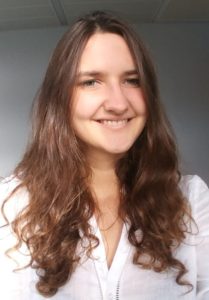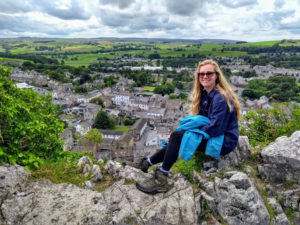By Rebecca Robinson and Ema Saltone, MSc Global Sustainability Solutions students
“Visualising new and complex ideas in ways we haven’t before” by Ema Saltone
 When the group of us entered the Kaleider studios on a Monday morning, having barely covered the welcome lectures and just about able to remember everyone’s faces, we had little idea of what to expect from the residential. It was all still new, still somewhat daunting, but also exciting.
When the group of us entered the Kaleider studios on a Monday morning, having barely covered the welcome lectures and just about able to remember everyone’s faces, we had little idea of what to expect from the residential. It was all still new, still somewhat daunting, but also exciting.
We were welcomed with free coffee – a smart trick to get at least the caffeine addicts in a good mood from the start.
With a group of blinking, wide-eyed students entering our habitat for the next three days, we began with introductions, as well as presentations from companies who were keen to work with us. Which was reassuring – it may be quite nice to be potentially employable.
With lifted spirits about our future careers, we got on with lectures and tasks that made up the residential. The parts I enjoyed most were interactive practical activities, which helped us to visualise new and complex ideas in ways we haven’t before – it was quite inspiring to feel your old understanding of the world tear apart as you learn to see the world in new ways. These tasks have planted seeds of new ideas which will probably influence the way I think for a long time.
I appreciated having been able to get to know others on the course throughout the residential. We worked in teams or pairs on most tasks, and so it was nearly impossible not to have spoken to mostly everyone. Not only spoken, we were pushed into a circle and forced to shake hands with everyone – quite literally. It’s not a scary as it sounds though, even the most introverted of us seemed a lot livelier afterwards. And – we knew everyone’s names by the end – something that I have not experienced during undergraduate studies (when 300 people in a lecture hall meant only speaking to the two people you met on the first day. So, this was a nice change).
Perhaps it was the amount of information that was blasted through our minds, or maybe just a summer without assignments having crippled our educational fitness, but the three days at the Kaleider studios were shattering. However, we have witnessed the excitement of the faculty and the external partners about our course, which made it hard not to get infected with the excitement. We were also given useful information to be ready for the course ahead. So, if not for anything else, the residential was useful as a memorable introduction to what awaits us, providing us with a frame of mind that I believe will benefit us throughout our studies.
“We had the opportunity to learn from people with a diverse range of backgrounds and saw how we could fit into the bigger picture of global sustainability” by Rebecca Robinson

Our week started as all good weeks should, with strong coffee. We were welcomed into the Kaleider Studio and settled in straight away to our jam-packed week of workshops, lectures and networking.
The residential covered a broad range of topics from how to define the Technosphere to looking at the implications of a new geological epoch. The studio was an excellent working environment and gave us the opportunity to branch out away from campus.
Our first afternoon was the chance to meet potential companies to complete our internship with. A unique aspect of the MSc Global Sustainability Solutions programme is the dissertation. Instead of completing an academic dissertation we are given the option of turning this into an internship with an external partner. During the afternoon we heard pitches from companies about their current sustainability issues and research options we could collaborate with them on.
For example, the Devon County Council representative was keen to find out what the barriers are to recycling and potential options for how they could be improved. The scope of the company’s pitches were wide ranging and offered a broad selection of topics from construction to sailing. We were then let loose to network with the partners and discuss potential internships for the Summer.
Day two’s focus was on ways we can discuss and teach climate change. We were introduced to the dialogic approach and the bicycle model for climate change education at school. We were shown the importance of co-production and how the effect on everyone needs to be incorporated into the method used. The afternoon was an introduction to systems thinking, showcased through a series of games and practical activities. The day concluded with a session on how to make changes by choosing the appropriate entry point. We were shown the importance of language, humour and conveying a positive message.
The final day gave us the opportunity to build on our understanding so far and start thinking about our group work to come. The morning’s topic was prosocial behaviour followed by an exercise looking at how we wanted the future to look vs how to get there.
These three days were the perfect opportunity to delve into the course content in an engaging but relaxed format. We had the opportunity to learn from people with a diverse range of backgrounds and saw how we could fit into the bigger picture of global sustainability.
